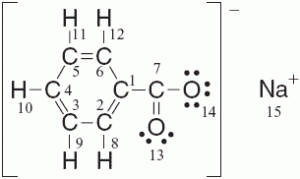Sodium Benzoate – Killing While Preserving
 You’ve probably seen sodium benzoate listed in the ingredients of many foods. These days, it’s pretty much in everything because it’s used as a preservative in carbonated drinks, fruit juices, processed foods, salad dressings, condiments, pickles, cough syrup and even some vitamins.
You’ve probably seen sodium benzoate listed in the ingredients of many foods. These days, it’s pretty much in everything because it’s used as a preservative in carbonated drinks, fruit juices, processed foods, salad dressings, condiments, pickles, cough syrup and even some vitamins.
The troubling aspect of this is that sodium benzoate can be extremely hazardous to your health, especially when mixed with Vitamin C. So, although sodium benzoate, AKA E211, is commonly thought of as a safe food additive, it really is anything but.
One of the more disturbing effects that sodium benzoate can have is that it shuts down vital parts of a cell’s mitochondria. Mitochondria are responsible for consuming oxygen found within the cells and generating our body’s energy. Shutting down mitochondria, then, can have devastating effects at our very cellular level, first and foremost being free radical production and rampant oxidation.
Parkinson’s and other neurodegenerative diseases as well as accelerated ageing are all linked to this type of DNA damage. You may remember from my recent article on telomeres and their role in the ageing process that accelerated ageing is triggered by DNA damage that signals a stop to cellular division.
The ADHD Connection
Experts have also noted that consumption of sodium benzoate is implicated in heightened hyperactivity in children, which can mimic ADHD behavioural symptoms. The connection is a controversial one and more studies need to be done, but there does, indeed, seem to be a strong indication that mixing sodium benzoate with certain artificial food colours can trigger hyperactive behaviour in normal children. You can imagine, therefore, what the result might be for hyperactive kids or those suffering from genuine ADHD.
With most calories in the North American diet coming from high-fructose corn syrup (HFCS) in soft drinks, is it really any surprise that our kids are hyperactive? If we’re going to amp them up on ridiculous amounts of a lethal form of fructose, tossing in sodium benzoate while we’re at it, how can they not bounce off the walls? It’s not a surprise to me that ADHD and hyperactivity are out of control.
Carcinogen In Your Juice
Vitamin C is crucial to our health and well-being, so it makes sense that many of us would want to pick up a juice pack for a pick-me-up. The risk here is if the juice or packaging contains sodium benzoate, the sodium benzoate will react with the Vitamin C to create benzene. Benzene is a well-known carcinogen.
Many carbonated beverages and juices actually advertise that they have Vitamin C added. You’ll want to take a close look to make sure that there is no sodium benzoate in there. The combination is potentially lethal, as benzene has been listed as a Class A carcinogen by the EPA. It’s dangerous stuff.
The problem with Vitamin C doesn’t end there, however, as this vitamin is naturally present in all manner of foods to some degree. Even trace amounts of Vitamin C in a food can trigger a reaction with sodium benzoate. This means that the possibility of benzene levels in the food we eat being many times higher than the law allows is very real.
How to Avoid Sodium Benzoate
Ultimately, the only safe thing to do is to avoid the chemical altogether. How can we do that? First off, cutting soft drinks out of your diet is of paramount importance. Avoiding fruit juices is also good. (It’s better to eat fruit.) The most important aspect, however, is to avoid the consumption of processed foods.
This last one is a biggie. It’s only when you’re preparing your meals from scratch that you can be completely sure of what’s in them. And unless you’re in control of what you eat and drink, how can you be in control of your well-being?
Food, literally, for thought.



June 11, 2015 at 6:30 am
Learner
How does one get benzoate out of one’s system?
I’ve been treated for Stage 3 cancer, fortunately, its in remission, and I’m working on cleaning up any issues that could lead to recurrence. I recently had benzoate show up as one of 2 carcinogens ATTACHED to my DNA on an Acumen test, done in the UK.
My seemingly successful cancer treatment was high dose vitamin C, which I am now reading that it works with benzoate to convert to benzene….
Now what??? Avoiding it is fine, but seems like the horse is already out of the barn here…
Thank you.
June 11, 2015 at 7:18 am
Trane Francks
Hi, Learner. Thanks for dropping by!
To the best of my knowledge, the biological half-life of sodium benzoate is 2.8 days. That should mean that once ingestion has stopped, the vast majority of the stuff should be out of your system. With regard to your acumen test results, I’m afraid that I have to plead ignorance on your question.
That said, I would not be too quick to start worrying. A regimen of high-dose Vitamin C that interacts with a small amount of sodium benzoate is not going to generate much benzene. Moreover, benzene doesn’t stick around for along time, either; the liver gets it out of the body in relatively short order.
You may wish to investigate some kind of detoxification protocol. Personally, I focus on exercise as my means of eliminating toxicants/toxins. Remember, our primary means of eliminating such things are:
1. Respiration
2. Perspiration
3. Urination
When you exercise to the point of perspiration, you’re increasing the first two vectors of elimination. Add staying well hydrated and you’ll nicely increase urination.
Dr. Mercola is a proponent of using niacin in combination with exercise and sauna sessions as a means of detoxification. I have not fully investigated the therapeutic use of niacin in a detox protocol, but it is definitely worth discussing with your qualified medical practitioner. A chlorella supplement may also be worth investigating.
Worrying about things will definitely take an emotional and physical toll on you, so you’ll really want to stay positive and happy here. Focus on the fact that you’re in remission and that you’re continuing to improve your health day-by-day.
I hope that this has been of some help to you!
Warmest regards,
trane
March 25, 2015 at 3:31 pm
vahid
it is interesting really..if it was the fact the average age should be declined ,not increase , and 80 % of people should be died or collapsed due to cancer because almost all the people use drinks and processed foods.. especially in developed countries. these type of information are not supported by accredited data .
DR vahid.
March 25, 2015 at 5:00 pm
Trane Francks
Hi, Dr. Vahid. Thank you for your comment.
I think that an interesting sign of our times is that while we might live longer, we do not live healthier. It is well documented, for example, that while fewer people are dying of cancer, there is a greater incidence of cancer across most populations, especially children and young women. It’s especially important to not think in terms of extremes here. We have a great number of medical advances that are doing an admirable job of keeping people alive. That said, healthcare costs are soaring across the globe. Obesity, diabetes and metabolic syndrome is commonplace in 2015, whereas it was almost unheard of merely 50 years ago.
We live longer. We do not live healthier. And that, sir, is supported and well documented by accredited data.
Warmest regards,
trane
December 5, 2010 at 9:56 am
Linda Raymond Quirk
As a person who has noticeable sensitivities to many food additives, flavor enhancers, preservatives etc., I am well aware of the dangers and troubles associated with such items.
It is unfortunate that these additives are allowed to be in foods, juices, medicines, etc. as the sideaffects and/or symptoms associated with ingestion are plenty. The symptoms range from slight to debilatating and in some cases death.
Thank u for trying to bring this tragedy to light!
December 7, 2010 at 11:16 am
trane
I’m sorry that you suffer from sensitivities, Linda. So many people do these days! Unfortunately, people are being taught that being unwell is pretty much the norm. I want to raise awareness to the fact that it doesn’t need to be this way.
Be well. 🙂